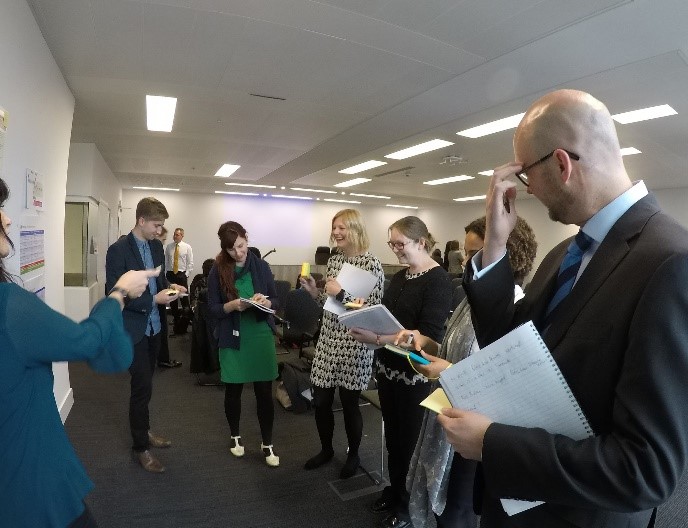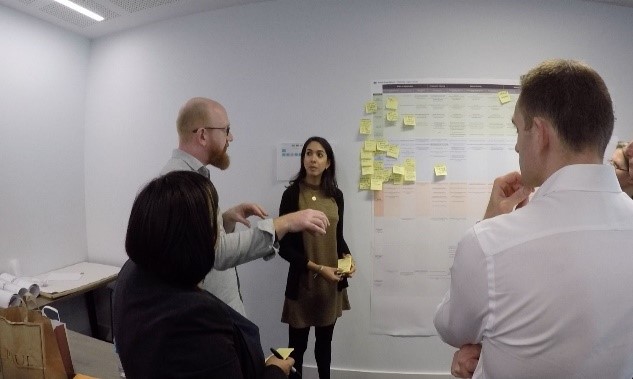[English] - [Cymraeg]
I’m Emma Petty, Service Manager for the Public Law project and I’d like to update on the project, its aims, and how it will be delivered.
Our Public Law project sits in the family jurisdiction and forms part of the wider HMCTS £1bn reform programme. In October 2017, we set out our intention to reform the service around taking a public law case to and through court.
Public law cases are those brought, usually by local authorities, to safeguard the welfare of a child they feel is in danger. There are a number of different orders that a local authority can apply for but the most common is a care order, which means the local authority can make decisions as to where the child will live and with whom, and who and how the child will have contact with.
Designing a seamless digital system - which supports efficient and effective inter-agency working, so important in cases like this - will ultimately benefit some of the most vulnerable children in our communities.
Early views and engagement
Before the project started, in September 2017, I shared our early views on how existing e-working practices might be improved through our Public Law project. Since then the project has launched, we’ve held an event with colleagues and partners (such as Local Authorities, CAFCASS and legal practitioners), and we’ve got greater clarity about the scope of reform that we’d like to pursue.


These early engagement sessions have been invaluable in understanding the end-to-end process - from application through to final order - through the eyes of our users. We’ve also learned a lot about the difficulties that users currently experience in preparing for a hearing, the experience of a hearing itself and ultimately when court orders are issued.
This is where we feel we can make a real difference...
Making a difference
We want to make the public law process more efficient, ensuring the court, parties and their representatives have access to the right information at the right time to help decide the best outcomes for children involved in public law cases. Based on our early thinking, the aims of the project could be to:
- provide an online application process which speeds up the gatekeeping process and shares information with partner agencies at the point of submission
- improve the process for dealing with urgent applications
- enable users to see the progress of their case and to take action to progress their case online
- provide clear signposting to support available outside HMCTS, to assist parties acting in person and without a lawyer
- enable users to upload and access documents and evidence digitally both outside and inside the courtroom
- ensure suitable facilities and support are provided at hearing centres
- enable hearings, where appropriate, to be conducted online
- provide fast digital access to outcomes of hearings
- ensure those who need it get the support they need to access our digital services.
Our approach and progress to date
We’ll take an ‘agile’ approach to designing, building and delivering each aspect of the new service. This means starting small, designing a new way of working, and testing it before making further changes. We’ll also learn from the other digital services that we’ve developed – such as divorce and civil money claims – rather than re-inventing the wheel.
After talking with people who have direct experience of public law cases, we’ve identified some priorities for the project: filing bundles of evidence and document management. We’ve already started work on this.
We plan to provide a shared storage solution to help with filing evidence and documents digitally. It will enable us to continue to be the ‘host’ for digital documents and evidence, along with an online application, to make up a digital court file. These mirror current paper practices, where we receive documents and evidence on paper and are responsible for holding, making available and storing the paper court file.
We are very aware that some local authorities have already invested in systems which help them produce and manage their bundles digitally. We’ll work with suppliers of those systems, and other stakeholders, so that wherever possible and viable, systems already in use can integrate with the planned shared storage solution and will continue to engage regularly with stakeholders.
What next
We hope to invite a few local authorities to test our first iteration of the shared storage solution by this summer. This will help us to test, improve and add functionality, before developing it further.
I hope this introduction to the Public Law project, its aims, the progress we’ve made to date and our next steps has been helpful. I look forward to providing regular updates through this blog, if you have any questions please use the comment facility at the bottom of this page.
[English] - [Cymraeg]
Emma Petty ydw i, Rheolwr Gwasanaeth ar gyfer y prosiect Cyfraith Gyhoeddus, a hoffwn roi diweddariad ar y prosiect, ei amcanion, a sut caiff ei gyflawni.
Mae ein prosiect Cyfraith Gyhoeddus o fewn yr awdurdodaeth teulu, ac mae’n ffurfio rhan o raglen ddiwygio ehangach GLlTEM, sydd wedi cael buddsoddiad o £1 biliwn. Ym mis Hydref 2017, pennwyd ein bwriad i ddigideiddio'r prosesau sy’n ymwneud â chyflwyno achos cyfraith gyhoeddus i’r llys a symud yr achos hwnnw yn ei flaen.
Achosion cyfraith gyhoeddus yw'r achosion hynny a gyflwynir, gan awdurdodau lleol fel arfer, i ddiogelu lles plentyn maent yn meddwl sydd mewn perygl.Mae yna nifer o wahanol orchmynion all awdurdod lleol wneud cais amdanynt, ond yr un mwyaf cyffredin yw gorchymyn gofal, sy'n galluogi awdurdod lleol i wneud penderfyniadau o ran gyda phwy fydd y plentyn yn byw, a gyda phwy fydd y plentyn yn cael cyswllt a hwy a sut fath o gyswllt fydd hyn.
Bydd dylunio system ddigidol esmwyth - sy'n cefnogi gwaith amlasiantaethol effeithlon ac effeithiol, sy'n hollbwysig gydag achosion fel hyn – yn fuddiol i rai o’r plant mwyaf bregus yn ein cymunedau yn y pen draw.
Barnau cychwynnol ac ymgysylltu
Cyn i’r prosiect gychwyn, ym mis Medi 2017, mi wnes i rannu ein barnau cychwynnol ar sut oedd modd gwella arferion e-weithio presennol trwy ein prosiect Cyfraith Gyhoeddus. Ers hynny, mae’r prosiect wedi’i lansio, ac rydym wedi cynnal digwyddiad gyda chydweithwyr a phartneriaid (megis Awdurdodau Lleol, CAFCASS ac ymarferwyr cyfreithiol) ac mae gennym gwell syniad o ran cwmpas y broses ddiwygio yr hoffwn ei ddilyn.
Mae’r sesiynau ymgysylltu cynnar hyn wedi bod yn hynod werthfawr o ran helpu ni i ddeall y broses o’r dechrau i’r diwedd - o wneud cais hyd at y gorchymyn terfynol - trwy lygaid ein defnyddwyr. Rydym ni wedi dysgu llawer am yr anawsterau mae defnyddwyr yn eu profi ar hyn o bryd wrth baratoi ar gyfer gwrandawiad, y profiad o fod mewn gwrandawiad a’u profiad pan fydd gorchmynion yn cael eu cyflwyno.
Rydym yn teimlo gallwn wneud gwahaniaeth mawr yma...
Gwneud gwahaniaeth
Rydym eisiau gwneud y broses cyfraith gyhoeddus yn fwy effeithlon, gan sicrhau bod gan y llys, y partïon a'u cynrychiolwyr fynediad at y wybodaeth iawn ar yr amser iawn er mwyn eu helpu i benderfynu ar y canlyniadau gorau ar gyfer plant sy’n destun achosion cyfraith gyhoeddus. Yn seiliedig ar ein meddyliau cynnar, gall amcanion y prosiect gynnwys:
- darparu proses ymgeisio ar-lein sy’n cyflymu'r broses ddidoli ac yn rhannu gwybodaeth gydag asiantaethau partner pan gyflwynir cais
- gwella’r broses ar gyfer delio â cheisiadau brys
- galluogi defnyddwyr i weld unrhyw gynnydd gyda’u hachos a gweithredu er mwyn symud yr achos yn ei flaen ar-lein
- cyfeirio defnyddwyr at gefnogaeth sydd ar gael y tu allan i GLlTEM mewn ffordd glir, er mwyn cynorthwyo partïon sy'n gweithredu dros ei hunain ac sydd heb gyfreithiwr
- galluogi defnyddwyr i lwytho a chael mynediad at ddogfennau a thystiolaeth yn ddigidol, y tu mewn a thu allan i’r ystafell llys
- sicrhau bod cyfleusterau a chefnogaeth addas yn cael eu darparu mewn canolfannau gwrandawiadau
- galluogi gwrandawiadau gael eu cynnal ar-lein, lle bo’n briodol gwneud hynny
- darparu mynediad digidol cyflym at ganlyniadau gwrandawiadau
- sicrhau bod y rhai hynny sydd angen cefnogaeth i gael mynediad at ein gwasanaethau digidol yn ei chael
Ein dull gweithredu a'r cynnydd hyd yma
Byddwn yn mabwysiadu dull 'ystwyth’ tuag at ddylunio, adeiladu a chyflawni pob agwedd o’r gwasanaeth newydd. Mae hyn yn golygu dechrau’n araf bach, dylunio dull newydd o weithio, a'i brofi cyn gwneud unrhyw newidiadau pellach. Byddwn hefyd yn dysgu gan y gwasanaethau digidol eraill rydym wedi'u datblygu - megis y gwasanaeth ysgaru a’r gwasanaeth hawliadau arian yn y llys sifil – yn hytrach na dechrau o’r dechrau.
Ar ôl siarad gyda phobl sydd â phrofiad uniongyrchol o achosion cyfraith gyhoeddus, rydym wedi adnabod blaenoriaeth i’r prosiect: ffeilio bwndeli tystiolaeth a rheoli dogfennau. Rydym eisoes wedi dechrau gweithio ar hyn.
Ein bwriad yw darparu trefniadau ar gyfer storio cydwasanaethau i helpu gyda ffeilio tystiolaeth a dogfennau’n ddigidol. Bydd yn ein galluogi i 'gadw' dogfennau a thystiolaeth ddigidol, ynghyd a chais ar-lein, er mwyn creu ffeil llys digidol. Mae’r rhain yn adlewyrchu arferion papur presennol, pan fyddwn yn cael dogfennau a thystiolaeth ar bapur ac yn gyfrifol am gadw, rhannu a storio’r ffeil llys papur.
Rydym yn llwyr ymwybodol bod rhai awdurdodau lleol eisoes wedi buddsoddi mewn systemau sy'n eu helpu i gynhyrchu a rheoli eu bwndeli yn ddigidol. Byddwn yn gweithio gyda chyflenwyr y systemau hynny, a rhanddeiliaid eraill, fel bod systemau sydd eisoes yn cael eu defnyddio yn cael eu hintegreiddio gyda’r trefniadau arfaethedig ar gyfer storio cydwasanaethau, pan fo'n bosib ac yn ddichonadwy, a byddwn yn parhau i ymgysylltu â rhanddeiliaid yn rheolaidd.
Beth nesaf
Gobeithiwn wahodd rhai awdurdodau lleol i brofi ein fersiwn gyntaf o’r trefniadau storio cydwasanaethau erbyn yr haf hwn. Bydd hyn yn ein helpu i brofi, gwella ac ychwanegu rhagor o swyddogaethau iddo, cyn ei ddatblygu ymhellach.
Gobeithiaf fod y cyflwyniad hwn i’r prosiect Cyfraith Gyhoeddus, ei amcanion, y cynnydd hyd yma a’r camau nesaf wedi bod yn ddefnyddiol. Edrychaf ymlaen at ddarparu diweddariadau rheolaidd trwy’r blog hwn. Os oes gennych unrhyw gwestiynau, defnyddiwch y cyfleuster ar gyfer gwneud sylwadau ar waelod y dudalen hon.

2 comments
Comment by Zoe Banton posted on
I think that's good of the court and fair for the parent to get a fair hearing
Comment by Chris Dalton posted on
Making public services and public resources more accessible has to be a step in the right direction. The public need to be able to use and understand services that they may not be aware exist.
We (https://www.finalduties.co.uk/probate-questions-and-answers/) handle dozens of calls a month from members of the public who are often charged for probate or will information that they could have obtained for free simply using the .gov services already provided.